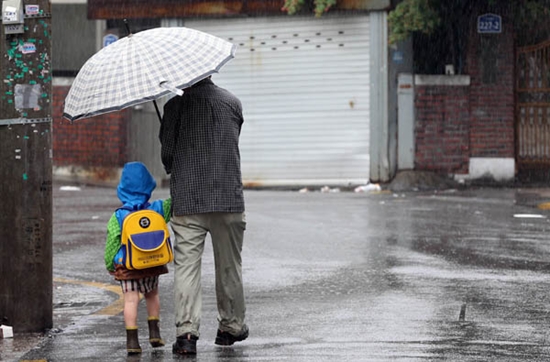|
Day care centers [1]slam doors on [2]working moms
 |
| A grandfather takes his grandson home from a day care center in Gusan-dong, Eunpyeong District, northern Seoul. By Kang Jung-hyun |
After leaving the workplace to have a child, a 31-year-old woman in Seongnam, Gyeonggi, decided to go back to work three months ago. What she needed most was [3]a day care center to look after her 15-month-old daughter until she [4]got off work in the evening.
[5]Easier said than done. The [6]frustrated mother [7]got in touch with more than 30 day care centers and asked if they could [8]take care of her daughter until 7:30 p.m. Almost all refused.
“I finally found one center that agreed to look after my daughter until 7:30 p.m.,” said the mother. “But if I am late for a few minutes because of traffic, I get calls from the center [9]urging me to get there as soon as possible.”
Mrs. Kwon, 32, had a similar problem.
“Because of my work, I needed someone to take care of my 22-month-old daughter for 11 hours a day, from 8 a.m. until 7 p.m.,” said Kwon. “Over 40 day care centers refused. I finally found one center in Seocho District [in southern Seoul] that agreed to take her.”
Take another case of a mother who [10]applied for a place in a day care center for her 15-month-old child. She told the center she was [11]a full-time housewife. The day care center responded positively in less than a month.
“Before I quit my job, I applied to the same place saying I was a working mom,” she recalls. “I did not get a call from the center for over a year.”
For all the stories about the [12]expansions of day care for Korean families, these three stories show that finding a place for a [13]toddler is still a [14]challenge for working mothers - even though the law [15]is on their side.
Under [16]child care laws, day care centers are required [17] to give priority to families with two working parents over families with only one. But their priorities are often the [18]reverse.
And both [19]public and private day care centers are required by law to run their businesses for 12 hours a day, from 7:30 a.m. to 7:30 p.m.
But working mothers all say all of the [20]regulations [21]are flouted by private care centers. In interviews with the JoongAng Ilbo, a number of working mothers said they [22]were shocked at how private day care centers [23]rebuffed them [24]as soon as they heard they were full-time working moms.
A 52-year-old teacher in Dongdaemun District, central Seoul, told the JoongAng Ilbo that her center owner selected which kids to accept solely [25]based on whether their mothers are employed. If they were, the kids weren’t accepted.
Among 30 working parents interviewed by the JoongAng Ilbo, 16 said a grandparent [26]picks up the child or children from day care centers in the afternoon between 3 and 6 p.m. because the centers refuse to work any later. After work, the parents collect the kids from the grandparents’ houses. People who run day care centers have their side of the story.
“The state [27]support budget for day care centers remain the same [28]regardless of different hours of caring,” said one center owner in Songpa District, southern Seoul, speaking [29]on the condition of [30]anonymity.
“As the [31]financial reward is the same [whether a mother picks up her child at 4 p.m. or 7:30 p.m.], it is [32]inevitable for day care centers to prefer children with mothers working from home.”
Another center owner who runs a center in Jungnang District, central Seoul, said the government should [33]step up its support measures for day care centers.
“[34]The government support measures for day care centers do not [35]differentiate different caring hours, thus making center owners reluctant to take children raised by working parents,” said Prof. Lee Bong-ju of [36]social welfare studies at Seoul National University. “The [37]authorities should [38]take action to increase support for working parents even if it means [39]shrinking [40]the size of aid programs for families with mothers working in the home.”
[1]slam doors: 쾅하고 문을 닫다
[2]working moms: 직장에 다니는 엄마들
[3]a day care center: 어린이집, 탁아소
[4]get off work: 일을 마치다
[5]Easier said than done: 행동보다는 말이 쉽다
[6]frustrated: 낙담한, 좌절한
[7]get in touch with ~: ~에 연락하여 알아보다
[8]take care of ~: ~을 돌보다 (= look after)
[9]urge: 재촉하다, 촉구하다
[10]apply for~: ~에 지원하다
[11]a full-time housewife: 전업주부
[12]expansion: 팽창, 확대, 신장
[13]toddler: 유아
[14]challenge: 난관, 난제
[15]be on one’s side: ~의 편을 들다
[16]child care laws: 아동 보호법
[17] to give priority to~: ~에게 우선권을 주다
[18]reverse: 반대, 거꾸로
[19]public and private day care centers: 공립 어린이집과 사립 어린이집
[20]regulations: 법규
[21]be flouted by~: ~에게 멸시받다
[22]be shocked at~: ~에 충격받다
[23]rebuff: 퇴짜놓다
[24]as soon as~: ~ 하자마자
[25]based on~: ~에 근거하여, ~을 기반으로 하여
[26]pick up: 가서 데려오다(= collect)
[27]support budget: 지원 예산
[28]regardless of~: ~에 상관없이
[29]on the condition of~: ~라는 조건 아래
[30]anonymity: 익명
[31]financial reward: 재정적인 보상
[32]inevitable: 불가피한, 어쩔 수 없는
[33]step up: 향상시키다, 발전시키다
[34]the government support measures: 정부의 지원조치
[35]differentiate: 차등을 두다
[36]social welfare studies: 사회복지학
[37]authorities: 관계당국
[38]take action: 조치를 취하다
[39]shrink: 줄이다, 축소하다
[40]the size of aid programs: 보조 정책의 규모
BY Shin Sung-sik, Jang Joo-young
Published: June 01, 2013
Source: KOREA JOONGANG DAILY < Copyright © The Gachon Herald All rights reserved > |
